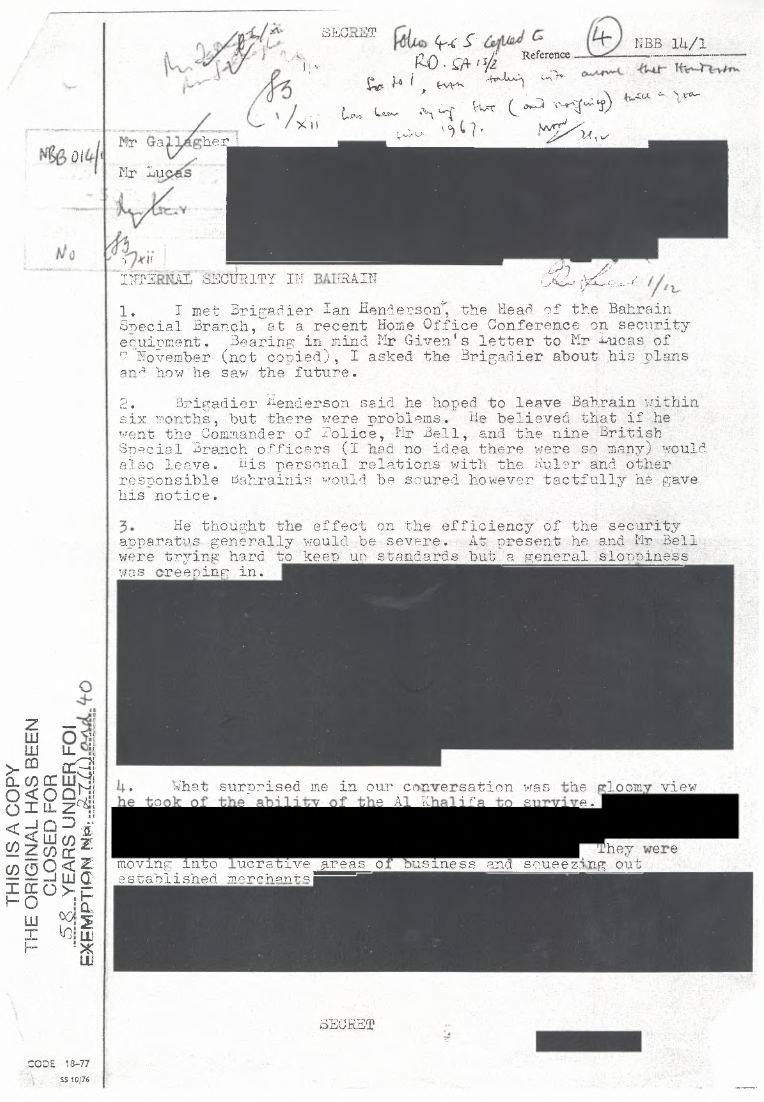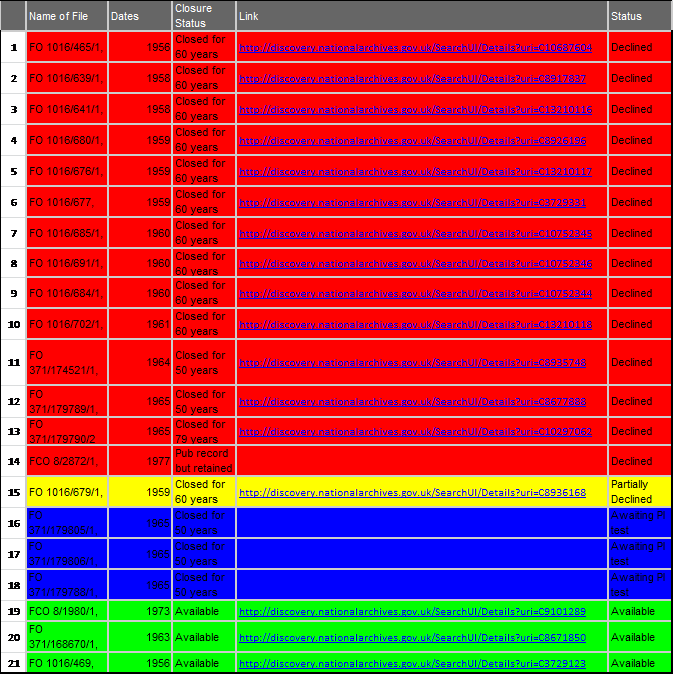[The following report was originally published by Bahrain Watch on 9 March 2015.]
Judge to Decide on 18-Month Battle to Release Secret British Documents on Bahrain
On 10 March, the Information Rights Tribunal in London will consider whether to order the Foreign Office to reveal 40-year-old secret communications between Foreign Office officials. In June 2013, Marc Owen Jones, a Durham University PhD student and member of the NGO, Bahrain Watch made a Freedom of Information Request to the FCO, requesting a secret file entitled “Bahrain: Internal Political situation 1977.” The FCO refused to disclose the full file, arguing that to reveal the information would damage international relations. Jones complained to the Information Commissioner who rejected his complaint on the basis that prejudice would be caused to the United Kingdom’s relations with Bahrain if it were made public. He then instructed London human rights lawyers, Deighton Pierce Glynn to appeal to the Information Tribunal, instructing barrister Sam Jacobs of Doughty Street Chambers. In his appeal he argued that to suggest that disclosing the record of a conversation which took place almost thirty-eight years ago, where one of the parties is now deceased, would damage the extremely close and durable relationship between Bahrain and the UK which has lasted for decades was completely absurd. He also argued it was unfair that the FCO’s full reasons for refusing to disclose the evidence were a secret so he has no chance to respond.
On 16 February, the FCO filed evidence at court from a senior diplomat, Edward Oakden, to the Middle East who will be giving evidence at the hearing. His statement (not for reproduction prior to him giving evidence) says:
Bahrain is a generous host to the Royal Navy and the Royal Air Force, providing basing and overflight rights free of charge. In December 2014, the Foreign Secretary signed a Memorandum of Understanding with the Government of Bahrain to establish a more permanent naval base in Bahrain, which the King has agreed to fund. The new agreement will provide improved facilities for UK Royal Navy personnel; allow us to expand our operational effectiveness in a volatile region; and will also provide us with a forward base for naval operations. [REDACTED] … If the Bahraini authorities were to conclude that confidential information exchanged during the course of UK reform assistance projects could now be released, they could be less inclined to continue to accept such assistance, as we have also seen happen in other countries. Disclosure of this material would then cause damage to our initiatives to enhance human rights, civil liberties and good governance at a time when the UK is providing increasingly sensitive assistance on police reform in the security sector.
Most of Mr. Oakden’s statement was redacted and will be considered by the tribunal at a secret “Closed” hearing within a hearing.
In his appeal, Marc Owen Jones said:
My appeal is reflecting public concern that the British Government has insulated the Government of Bahrain from criticism of serious human rights abuses including torture, and may have concealed evidence of serious wrong-doing. How can the government seriously use the recent decision to open a defence base in Bahrain to justify a decision to withhold information they made over 18 months ago?
I believe it is not in the public interest for the FCO to withhold information about the contentious relationship between Britain and Bahrain going back to the seventies. The spurious argument that the new British base deal should serve as a reason to keep the information secret is also objectionable, as the FCO`s decision to withhold came long before the new base deal was announced in December 2014. Furthermore, the nature of the hearing itself, in which most of the FCO`s evidence is secret, is also undemocratic, and makes a mockery of both the procedure and our right to know. As was noted in the white paper on our right to know, "unnecessary secrecy in government leads to arrogance in governance and defective decision-making". It is also questionable that the particular document being withheld is a conversation involving Ian Henderson, now dead, who is a Briton also accused of torture serving as head of the police during the brutal crushing of the Mau Mau Insurgency in Kenya. Here again involved in torture in Bahrain. But we may never know.
Jones also noted that “Given the recent case against the FCO by Kenyan Mau Mau, I am concerned that important evidence regarding the involvement of British citizens in quashing dissent in Bahrain is being withheld. Please bear in mind that one of the parties involved in this FOI request [namely Ian Henderson] played an important role in repressing the Mau Mau before going to Bahrain. I believe it is in the interest of the British public to know the exact extent of British involvement in the potentially nefarious activities used to crush dissent in Bahrain.”
His solicitor, Sue Willman said, “What is on trial here is the transparency and the accountability of the actions of the British Government in relation to Bahrain. Also on trial is the worrying trend towards secret justice in the UK, when most of the relevant evidence will be heard in closed proceedings so my client has no idea what is being said and no means of challenging it ”.
The basis of appeal – an attempt at lifting the shroud of secrecy:
- Procedural unfairness. Previous refusals have relied on a review of undisclosed material but also on reasons which are not disclosed. The FCO appears to have reviewed documents, while Jones was not even given an opportunity to respond to any reasons given. Previous decisions lacked sufficient information and so are procedurally unfair. Jones believes more of the information relied upon should be made public and fuller reasons given so that he is able to properly respond to it.
- No real and direct causal relationship exists between potential disclosure and claimed prejudice. To suggest that disclosing the record of a conversation which took place almost thirty-seven years ago, where one of the parties is now deceased, would damage the extremely close and durable relationship between Bahrain and the United Kingdom which has lasted for decades is Marc argues “completely absurd.” Jones hopes to produce evidence that the disclosure of far more significant information has not damaged the United Kingdom’s relations with Bahrain. It is unclear why this claim needed to be dealt with in secret, and it is submitted that this is procedurally unfair.
- General public interest in promoting transparency, accountability, public understanding and involvement in the democratic process. This interest also extends to citizens of other countries. Britain has a long history of close relations with Bahrain against a background of allegations of egregious human rights abuses including torture and extra-judicial executions. There is public concern that the British Government has insulated the Government of Bahrain from criticism, and may have concealed evidence of serious wrongdoing. This factor does not appear to have been given any weight and has not been referred to in previous decisions.
- The public interest in presenting a full picture. “In terms of arguments in favor of disclosure, the Commissioner agreed “that disclosure of the redacted information would provide a further and genuinely informative insight into the security situation in Bahrain in the 1970s”. Jones argues that this is a limited approach and there is public interest in presenting a fuller picture.
- The public interest in the removal of a plausible suspicion of wrongdoing, which clearly applies in relation to both Ian Henderson and UK Government officials in this case. The evidence could shed light on the question of complicity by these actors or otherwise in egregious acts against citizens of Bahrain. The information could have a potential in this situation to help remove the plausible suspicion of wrongdoing, while the matters are still within collective memory but at a time period which is sufficiently far removed to reduce embarrassment to those involved. Again, this factor does not appear to have been given any weight.
The document in question: “Bahrain: Internal Political situation 1977”
The document concerns the internal security situation in Bahrain and was between Henderson himself and an FCO official, David Tatham. It is therefore believed that the document might have important information pertaining to Henderson’s role and his activities in Bahrain. Information released under FOIA requests alludes to serious issues within the security services, and it would be important to shed more light on the reasons for this, since such issues could have contributed to abuses in Bahrain. At this time, there were 11 British police officers including Ian Henderson in Bahrain, so the UK government had a role in events in Bahrain.

–START TEXT:
I met Brigadier Ian Henderson the Head of the Bahrain Special Branch, at a recent Home Office Conference on security equipment […] I asked the Brigadier about his plans and how he saw the future. Brigadier Henderson said he hoped to leave Bahrain within six months, but there were problems. He believed that if he went the Commander of Police, Mr Bell, and the nine British Special Branch officers (I had no idea there were so many) would also leave. His personal relations with the ruler and other responsible Bahrainis would be soured however tactfully he gave his notice. He thought the effort effect on the efficiency of the security apparatus generally would be severe. At present he and Mr Bell were trying hard to keep up standards but a general sloppiness was creeping in. [REDACTED] What surprised me in our conversation was the gloomy view he took of the ability of the Al Khalifa to survive. [REDACTED] They were moving into lucrative areas of business and squeezing out established merchants. D.E. Tetham Middle East Department 1st December 1977 –END TEXT
FCO Censorship and the Right to Know: Two-Thirds of FOI Requests Declined
Bahrain Watch has made 21 FOI requests of which two thirds (fourteen in total) have been declined on similar grounds, one partially released, three are awaiting public interest tests and three have been made available. This campaign is being conducted by researchers and PhD researchers. If you have made any FOI requests related to the Gulf, please get in touch.

The public hearing will take place at 10am at the following address:
Field House
15 Bream’s Buildings
London
EC4A 1DZ
Please join the demonstration starting at 9am outside the court house.